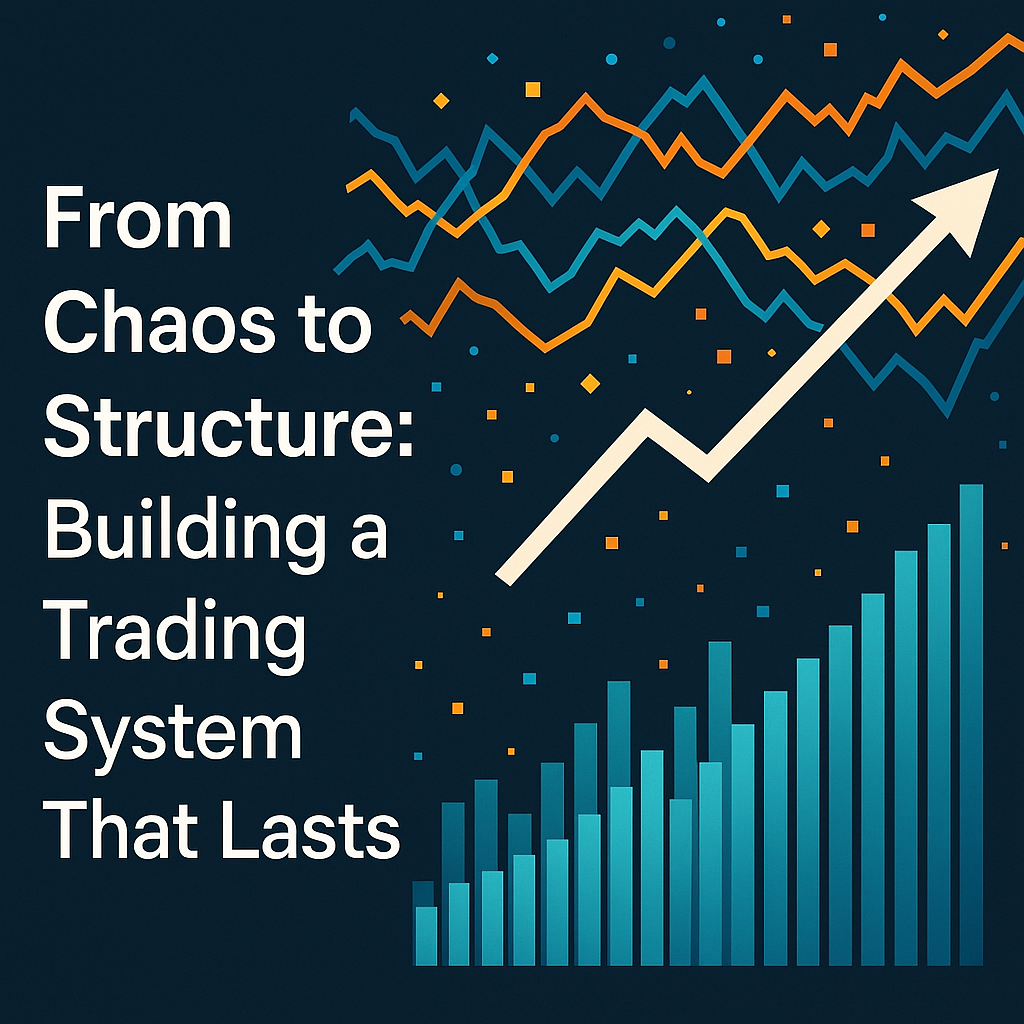Chaos to Structure trading is exciting but can also feel confusing and stressful. Prices go up and down very fast. News can change the market suddenly. Your feelings might jump from hope to fear with every trade. Many new traders get lost in all this noise and make mistakes like chasing trades, trading too much, or giving up quickly.
The truth is, success in trading doesn’t mean you have to guess every market move right. It means having a simple, clear trading system that helps you stay calm and steady no matter what happens. Think of a trading system as a map that guides you through the noisy market.
Without a system, many traders trade based on feelings or tips from others. This usually leads to losses and frustration. They might keep switching strategies without really learning any. They might risk too much money on one trade or forget their mistakes because they don’t keep a record.
To move from chaos to control, you need a plan with clear rules. This plan should tell you exactly when to trade, what to trade, and how to trade. It should also include strong rules to manage your risk, so you don’t lose too much on any trade.
Another important part of a good system is keeping a trading journal. Writing down your trades, why you took them, and what you learned helps you see your mistakes and get better. Having a daily routine for checking the market before trading and reviewing your trades after helps build good habits and keeps your emotions under control.
From Chaos to Structure: How to Build a Trading System That Lasts
Trading can feel messy and confusing. Prices go up and down without warning. News can change the market suddenly. Your feelings go up and down with every trade. Many new traders get excited at first but soon feel lost in all the noise. They start chasing trades, making too many trades, or reacting without thinking.
But here’s the truth: Success in trading doesn’t mean guessing every move. It means building a system that can handle the chaos and keep working.
Why Trading Feels Like Chaos
Most traders start without a clear plan. Without a plan, the market feels like a jungle with no path. Common reasons for chaos are:
-
Trading based on feelings or tips, not clear rules
-
Risking too much money on one trade
-
Not keeping track of past trades and mistakes
-
Trying too many strategies without mastering one
Chaos leads to losses because there’s no clear system to follow.
How STRATEGIC Helps You Build Structure
At STRATEGIC, we see trading as a skill you can learn with rules and practice. A good trading system answers three questions:
-
When will you trade? (What time and market conditions)
-
What will you trade? (Which stocks, currencies, or other markets)
-
How will you trade it? (When to enter, set stop loss, and take profits)
Having these rules helps you be creative and flexible but still stay safe.
The 5 Keys to a Strong Trading System
1. A Tested Strategy
Pick one simple strategy and learn it well. Test it in different markets to see how it works.
2. Risk Control
Never risk more than 1–2% of your money on a trade. Use rules to decide how much to trade.
3. Keep a Trading Journal
Write down every trade: why you entered, how you felt, and what you learned. This helps you improve.
4. Have a Routine
Do your market research before trading, trade only during set times, and review your trades after the market closes.
5. Control Your Emotions
Follow your rules so you don’t let fear or greed make you trade too much or too fast.
How to Move from Chaos to Structure
-
Choose one market and one time frame to trade.
-
Use one strategy and test it for 50–100 trades.
-
Write down your trading rules clearly.
-
Make a daily habit of checking the market and writing in your journal.
Review your trades every week to see what you can do better.
Why Ethics Matter in Trading
Trading is not just about making quick money. It’s also about being responsible and honest while you trade. Without good ethics, trading can become risky and unfair to yourself and others.
At STRATEGIC, we believe ethics are very important for success that lasts. Here’s why:
Protect Your Money
Good ethics mean you don’t take big risks that can lose all your money. Instead, you manage your money carefully to keep it safe and grow it slowly.
Be Honest and Clear
Being ethical means being honest about your goals, your trading methods, and your results. You keep clear records and learn from both your wins and mistakes.
Treat Trading Like a Business
Trading is not a game or a way to get rich quickly. It’s a serious job that needs good planning and discipline. When you treat it like a business, you make smarter choices and build trust.
How AI Can Help You Stay on Track
Today, AI tools can help you watch your trades, find patterns, and warn you when you break your rules. STRATEGIC uses AI to help traders stay consistent, even when the market is crazy.
Signs You Have a Strong Trading System
It’s important to know when your trading system is working well. Here are some simple signs to look for:
1. Your Losses Are Small and Expected
A good system plans how much you can lose on each trade. So, if you lose, it doesn’t hurt your money too much because you were ready for it.
2. You Stay Calm When the Market Moves a Lot
The market goes up and down all the time. If you have a strong system, you don’t panic or get stressed. You trust your rules and keep following your plan.
3. You Don’t Stress About Missing Trades When You Take Breaks
With a good system, you know it’s okay to skip some trades. Good chances will come again, so you don’t worry if you miss a trade.
4. Your Results Are Steady Over Time
A strong system may not make big wins every day, but it helps you grow your money slowly and steadily over weeks and months.
FAQs
1. Why do many traders feel chaos when they start?
Because they trade without clear rules or a plan, leading to confusion and mistakes.
2.What is a trading system?
A set of clear rules that tells you when and how to trade.
3.Why is risk management important?
It helps protect your money by limiting how much you can lose on each trade.
4.What should I include in a trading journal?
Record your trade details, why you made the trade, how you felt, and what you learned.
5.How does having a routine help trading?
It keeps you disciplined and prevents random or emotional trades.
6.Can one strategy really work long term?
Yes, mastering one strategy and testing it well can lead to steady profits.
7.How can I control emotions while trading?
By following your trading rules strictly and not making impulsive decisions.
8.Why is reviewing trades important?
It helps you learn from mistakes and improve your system over time.
9.How does AI help traders stay consistent?
AI tracks your trades, spots patterns, and alerts you when you break your rules.
10.How will I know when my trading moves from chaos to structure?
When your losses are controlled, you stay calm during market changes, and your results are steady over time.
Conclusion: Structure Wins Over Talent
The market will always be unpredictable. Prices will surprise you. But the traders who win are not the smartest or fastest—they are the ones with a strong system.
Building a trading system takes time and patience. It means following your rules, managing risk, and learning from every trade—day after day.
If you want to trade for the long term, start building your system now. The market won’t wait.
want to read more about trading click here
Big Shoutout to the guys who made this blog happen UDM.




